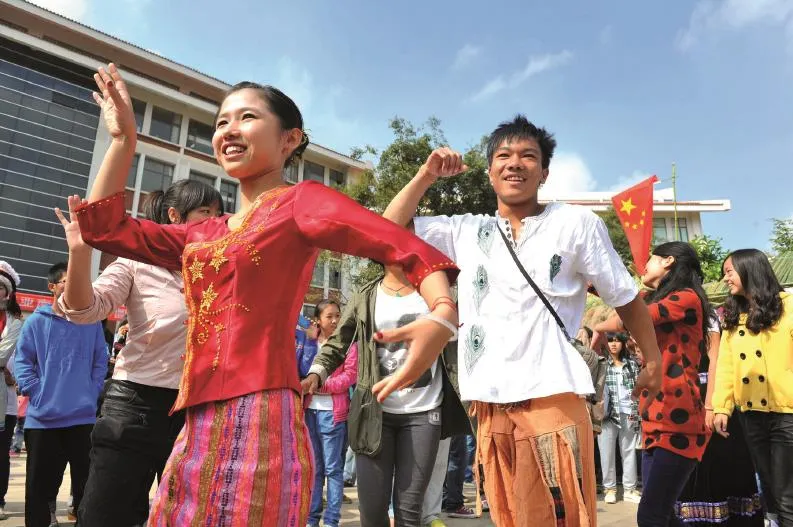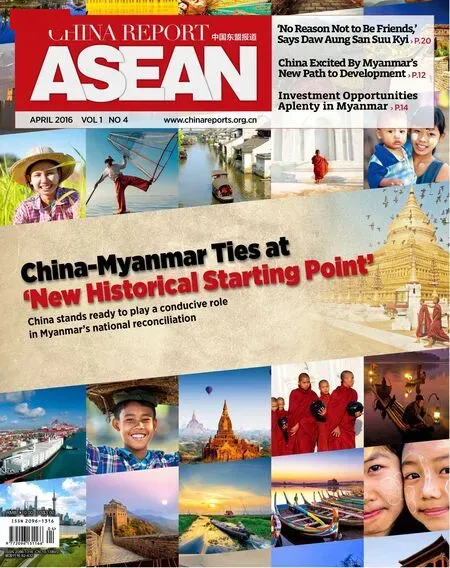Students on the Forefront of Friendship-Boosting Cultural Exchanges
2016-09-26ByHuXiaorong
By Hu Xiaorong
Students on the Forefront of Friendship-Boosting Cultural Exchanges
By Hu Xiaorong
“We come to school in China and enjoy the ‘two exemptions and one subsidy' policy just like Chinese students. That means we don't need to pay miscellaneous expenses and textbook fees and enjoy the subsidies for boarders,” said Hao Qingsen, a Senior Two student from Myanmar now studying at the Zhenkang County No. 1 High School. “I began to study in China as a ffh grader in 2009.”
As the traditional friendship between China and Myanmar has continued to deepen in recent years, so has the number of Myanmar students studying in China. In particular, in areas of China's Yunnan Province which abuts Myanmar. Te border schools feature nine-year compulsory education and attract children from Myanmar by virtue of the excellent teachers and good school conditions on ofer.
Myanmar Students in China
After finishing Senior Two, like other Myanmar students in the Zhenkang County No. 1 High School, Hao Qingsen can choose to study under a one-year bridging course in Lincang, a teaching center set up by the Preparatory Course Department of Overseas Chinese University in Kunming, before applying for admission to Xiamen University or Overseas Chinese University.
“I want to work in China afer graduation or go to Singapore or other countries for further education,” said Hao. Her siblings are now studying in the primary school of Zhenkang County.
On June 5, 2007, the Zhenkang County No. 1 High School was designated as a “Middle and Primary School Base for International Promotion of Chinese Language”, the only one of its kind in Lincang. Since the Kunming Chinese language and culture education base under the Overseas Chinese Affairs Office of the PRC State Council joined hands with the Zhenkang County No. 1 High School in establishing the bridging course in Lincang in August 2008, the school has worked hard to follow the principle of “cooperation, development, innovation, seeking truth and mutual beneft”.
Feng Dehao, Hao's schoolmate, came to China in 2007 when he was a second grader. He also expressed his wish to get a job in China afer graduating from university.
“China has developed very rapidly in the past nine years,” Feng said. “Cities are becoming more beautiful. The teaching quality is also getting better.”
Both Hao and Feng can freely use Chinese. Te latter said: “I hope the bilateral relations grow better and there are more economic and trade exchanges between the two. I have many friends studying in China. We all feel that the two countries can do a better job in developing economic ties.”
Feng believes China and Myanmar will have even more contact in the future, which means great opportunities for him.
Li Guojin, Director of the Executive Ofce of the Zhenkang County No. 1 High School, observed: “As relations between our two countries become increasingly close, there will be more Myanmar students wanting to study in China. When they return home after graduation, they will become the dominant force in promoting exchanges and serving as a bridge and bond in increasing mutual understanding of both sides.”
He hopes efforts will be made to strengthen faculty and infrastructure construction of the school to accommodate more Myanmar students. Special classes for them can be set up in an even more standardized manner, thus cultivating more cultural ambassadors between the two countries.

On Oct 28, 2015, the ffth Yunnan Minzu University Southeast Asian Cultural Festival opened in Kunming, Yunnan Province, as attendees from Myanmar, Thailand, Malaysia, India and seven other countries were welcomed by area university students. In addition to cultural exhibitions, the three day festival featured Myanmar, Thai, and Vietnamese Language competitions as well as multilingual speaking competitions. There were also various academic lectures.
A Big Boy with Dreams
Li Zhengchao, 28, is a junior student of the Chinese Language College of the Yunnan Normal University, majoring in Chinese for International Education. He once taught Chinese in a school in his homeland before coming to study in Yunnan.
“My mother is Chinese, so I'm already half-Chinese,” he said. He has been to Yunnan numerous times since 2007 and has a keen appreciation for Chinese culture.
“I have learned a lot about Chinese culture in Yunnan Normal University,” he said. “I've taken lessons in tea, art and Chinese calligraphy. I also know something about Taoism and other aspects of Chinese traditional culture,” said Li.
Chinese entertainment, too, has had a profound efect on Li.
“I really like Te Journey to the West [one of the four Chinese literature classics],” he said. “Te Monkey King in the TV series of The Journey to the West is very popular in Myanmar. Not long ago, I attended a lecture given by Liu Xiao Ling Tong, who plays the Monkey King. He talked about the spirit behind The Journey to the West, namely,‘working hard for a good command of the 72 changes and keeping optimistic in the face of the 81 difculties', and never giving up one's dream.”
Recent years have seen increasing exchanges between China and Myanmar in the political, economic and cultural felds. Chen Fuming, a Myanmar graduate of Yunnan University, decided to return to work in his own country. Chen said that in recent years, more Chinese enterprises have turned their attention to Myanmar, with growing investment in infrastructure.
“For the Myanmar people, China is a close friend,” Chen said. “Most of them know a lot about [China].”
Chinese Premier Li Keqiang paid a visit to Myanmar in November 2014. When communicating with the students in the No. 14 High School in Naypyidaw, the Premier said that he hoped the next generation would continue to improve strong relations between China and Myanmar.
The bright future of the friendship between these two countries can be seen in these young Myanmar students, as they work to improve their knowledge of Chinese language and culture.
